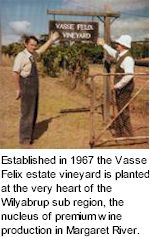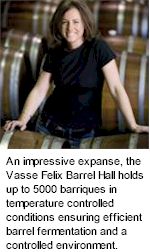


Situated in the sub-region of Willyabrup, Vasse Felix is now owned and operated by the Holmes a Court family. Visitors to the winery are welcomed by a unique underground cellar, a spectacular restaurant overlooking the original 1967 plantings and an exquisite art gallery, making Vasse Felix one of the great drawcards of the region. Margaret River enjoys perfect conditions for viticulture. It's Mediterranean climate features mild, wet winters and warm, dry summers - ideal for the growth of high quality fruit. By comparison with Bordeaux, Margaret River enjoys less rain during a longer, drier moderate growing and ripening period. In 1965 Dr John S Gladstones emphasised the region's suitability on his report "The Climate and Soils of Southern WA in relation to Vine Growing". Two years later Dr Tom Cullity planted his Vasse Felix vines.

The name Vasse Felix was inspired by an early event in the district. Thomas Vasse was a French seaman who disappeared after his longboat overturned near the site of Busselton whilst exploring the treacherous coastline of Western Australia. (An expedition of Captain Hamelin’s Naturaliste and Captain Baudin’s Geographe) Felix was Hamelin’s middle name, and ironically, is the Latin word for lucky.
The Vasse Felix logo is a peregrine falcon. When Dr Tom Cullity’s first vines began to bear fruit, native birds or ‘silvereyes’ as they are commonly known, had a keen appetite for the sweet berries, so Dr Cullity trained a falcon to deter the pests. Although much time and effort went into this exercise, upon the falcon’s first free flight it soared into the sky and was never seen again. The Vasse Felix logo endures to this day.
The estate's low yielding, dry grown vines are planted on some of the world’s oldest soils. The sites enjoy long, warm growing seasons and cooling summer breezes from the nearby Indian and Southern Oceans. This moderating effect is responsible for creating wines of exceptional concentration and intensity whilst retaining elegance and finesse – these cooling summer breezes from two oceans are unique to the southwest corner of Western Australia.

The vineyards are mostly sited on gravel loam and loam soils. Principal red varieties planted are Cabernet Sauvignon, Shiraz and Merlot while Chardonnay, Semillon and Sauvignon Blanc comprise the white varieties. Parcels of ultra premium fruit are fermented separately in small, static fermenters to retain the unique character of individual vineyards sites before being basket pressed and sent to the finest of French oak barriques.
The continuing worldwide demand for premium wines created the need for a new state-of-the-art winery at Vasse Felix. To meet the demands, the philosophy has always been that wines should be unique, distinctive and expressive of their surroundings. Though production levels have increased, the completion of the new Barrel Hall has provided the winemaking team with further control to maintain the quality of the wines. An impressive expanse, the Barrel Hall holds up to 5000 barriques in conditions that ensure efficient barrel fermentation and a controlled environment. Making use of the best equipment available, utilising the best production processes and an unwavering attitude to quality control, has made Vasse Felix winery one of the best in Western Australia.
Vasse Felix continues to be one of the most highly reviewed and esteemed wineries in Australia. The portfolio of Vasse Felix represents a definitive expression of variety and sense of place, wines that are consistent, elegant and complex with pronounced varietal character and aroma. The fermentation, maturation and bottling of all Vasse Felix wines takes place within the estate walls, ensuring the highest level of quality and consistency is maintained throughout the entire winemaking process.
